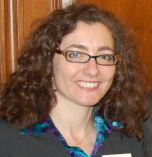Kelly Melear-Hough ’88 brings health services to vulnerable Tennessee residents
 Imagine going to see your doctor in the middle of a tomato farm where card tables and folding chairs serve as makeshift exam areas. That sight is an oasis for migrant farm workers in rural Tennessee who otherwise would have no access to health services.
Imagine going to see your doctor in the middle of a tomato farm where card tables and folding chairs serve as makeshift exam areas. That sight is an oasis for migrant farm workers in rural Tennessee who otherwise would have no access to health services.
Kelly Melear-Hough ’88, operations director at Rural Medical Services in Newport, Tenn., prides herself on helping underserved populations break through health care barriers.
“I go out with the team, and we provide free medical services,” explains Melear-Hough, who has been involved with the migrant health program since 1991 and served as its director for six years. “We’re located in Cocke County, which has a big tomato farm that employs over 300 migrant workers in July, August, and September. We’re considered a migrant stream — most that we see will go back to Florida for the winter months or back to Mexico. This past Tuesday night, we had a nurse practitioner and family practice physician as well as support staff. We actually see patients in the field and they can be seen for any type of problem they have. But our ability to provide services on site is limited because we only have what we can carry out there with us. We try to familiarize the migrant community with our services and where our clinics are located.”
Helping non-English-speaking people navigate U.S. health care has been a pivotal part of Melear-Hough’s career journey. Before she was even employed, she spent time with Spanish speakers and accompanied them to clinics to act as a translator with health care providers. Her first job was as an outreach worker for the East Coast Migrant Health Project (now Farmworker Health Services), which fit her ability to speak Spanish and interest in helping others.
In 2002, she received the Tennessee Primary Care Association’s Charles E. Darling Award for outstanding achievement in organizing, delivering, and/or financing health services to vulnerable populations. Melear-Hough’s work isn’t only idealistic; she has seen tangible results.
She helped add a second Rural Medical Services bilingual clinic, allowing RMS to serve 25 percent more patients. She wrote the grant proposal that brought federal funding to hire more practitioners and expand the number of exam rooms. Of the three grant proposals she’s worked on this year, she has received funding for two with the third still out.
Melear-Hough also helped spearhead a breast-health outreach project funded by the Komen for the Cure foundation for the last three years.
“We provide two health fairs, one in Newport and the other, which targets the Hispanic community, in Morristown,” she says. “One of our employees used to organize those fairs with me and she was involved with the mobile mammography company that would come out and do that for us. We also had invited the Komen affiliate to come and be part of our health fair and just provide information. The Komen foundation approached us and told us to apply for a grant, so I wrote the grant and designed a project where we would provide education and free mammograms to uninsured women between the ages of 40-49. We provide 170 mammograms per year for women who otherwise would not get those mammograms, and we found two breast cancers, which is two lives that may have been saved for having early detection and treatment. We also provide education to literally thousands of people each year with outreach workers teaching people about screening, monthly exams, and getting yearly physicals.”
Good mentors, small class sizes, and the opportunity to spend a semester in Spain her junior year made Lafayette a perfect fit for the anthropology and sociology graduate. Melear-Hough says her semester abroad made her fluent in Spanish, a skill she uses every day on the job.
“Learning how to write had a big impact on me and my ability to move up in the organization because now I’m a grant writer,” she says. “I’m able to bring in money to provide services to more people. Susan Niles, professor of anthropology, was a wonderful mentor for me and encouraged me to pursue anthropology. We had small classes so I got a lot of individual attention.”
 Imagine going to see your doctor in the middle of a tomato farm where card tables and folding chairs serve as makeshift exam areas. That sight is an oasis for migrant farm workers in rural Tennessee who otherwise would have no access to health services.
Imagine going to see your doctor in the middle of a tomato farm where card tables and folding chairs serve as makeshift exam areas. That sight is an oasis for migrant farm workers in rural Tennessee who otherwise would have no access to health services.